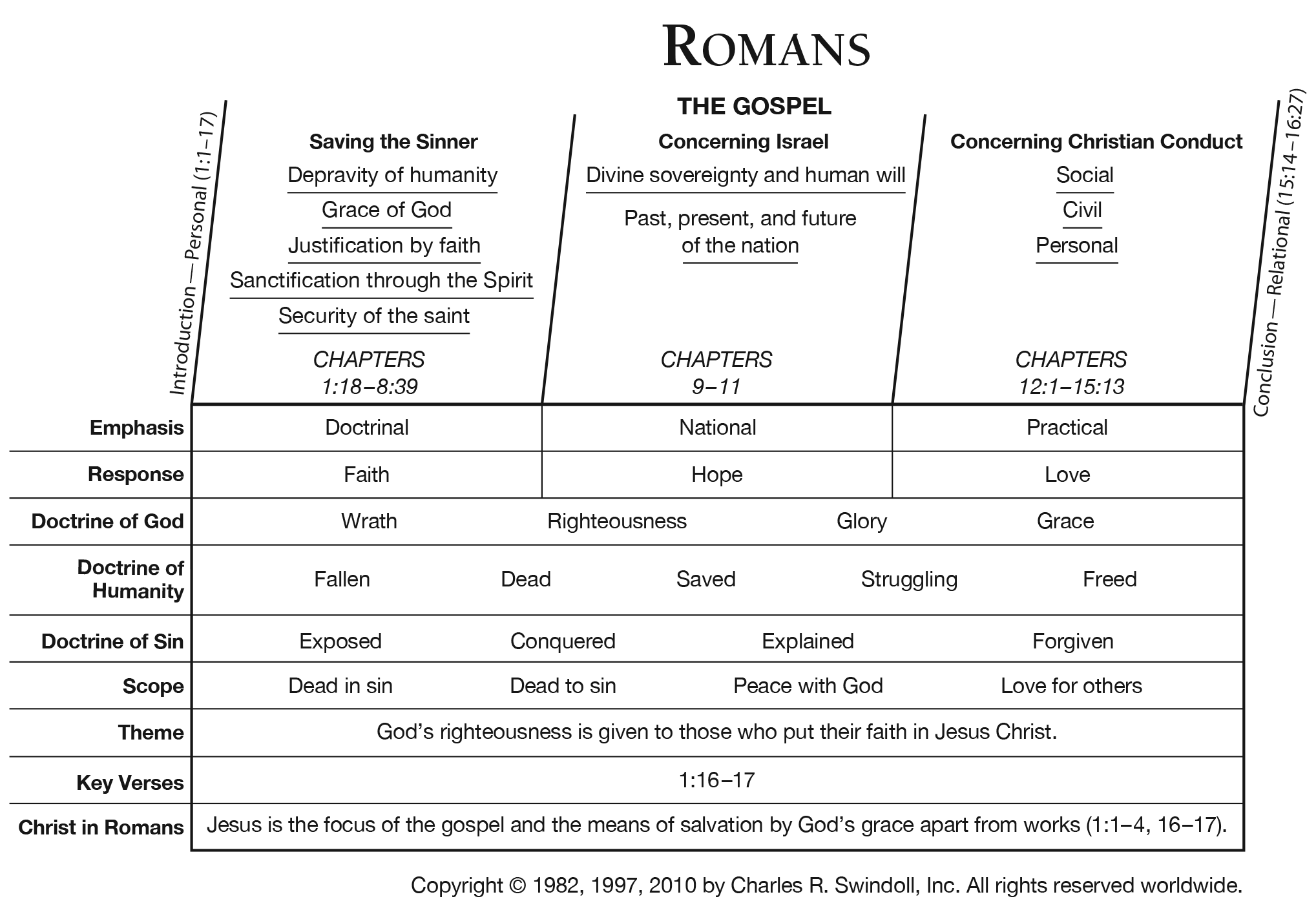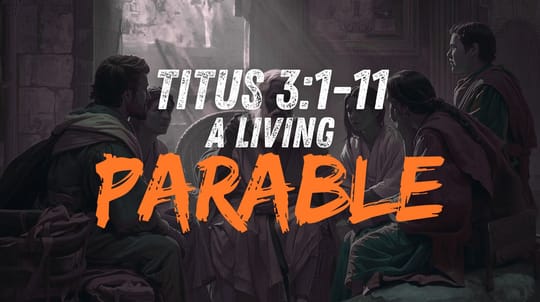Like a good detective, let's examine this book.
🔥 Overview
As a pastor, it is considered a "rite of passage" to teach a series on the book of Romans. Romans was written by Paul before his visit. In these 16 short chapters, he lays out a consistent theological foundation for Christianity. It is a clear and consistent picture from creation to the current day in terms of the grace and salvation of God.
🔍 Things to Notice:
The systematic progression of thought:
- chapter 1: how far we fell.
- chapter 2-3: The law was given so we could see how far from perfection we had fallen.
- chapter 4-6: Why Jesus came and how He provided the way back to God
- chapter 7-16: living in freedom alone and with the church.
🙏 Jesus in this Book
(Every book reveals the glory of God, revealed in Christ Jesus)
- The Righteousness of God
👀 Themes
- Sin
- Grace
- Justification
- No more condemnation.
😀 Who?
Who wrote it: The Apostle Paul
Martyred: Killed by Nero between 62 and 64 A.D. He beheaded. There were many more gruesome ways to die so this was considered a merciful death for a Roman citizen.
Who is the original audience: The city of Rome. The church was likely planted by Priscilla and Aquila. You can discover more about them in the book of Acts or click here.
🪧 Where?
Where are we: Paul wrote this letter while in the city of Corinth. Paul later writes 4 letters back to the city of Corinth. Two of them eventually became what we now know as first and second Corinthians.
⏳ When?
When was it written: 57 AD.
🤔 What?
What is the big idea: Romans is the clearest and most systematic presentation of Christian doctrine. Paul is writing to the most elite minds in the world at the time. He is using logic, philosophy, and his extensive knowledge of the Old Testament to lay out the Gospel in clear, easy-to-follow patterns.
🧐 Why?
Why is this book important: Romans is important so we can learn and know what we believe. We are able to discover a clear layout of Christian doctrine in the first several chapters and then what that means to us in day-to-day life in the second half. It is not enough to know it. We must also apply it.
📝 How?
How can I apply it?: Have you ever been in an earthquake? It is a disturbing feeling. The ground is not supposed to move. This is how it can feel to someone who is a Christian but has never really thought deeply about the foundation they have placed their life on. Romans gives us a systematic, logical framework to know God's Word and how to live within the freedom it provides.

Quick Thoughts on Each Chapter
Chapter 1: This is the first letter we are reading together. This is from Paul to the churches in Rome. At this point, Paul has not yet been to Rome. He is writing this letter in hopes of visiting soon. He systematically preaches the Gospel most likely in the way he would when he first visited a city. The pastors of the church in Rome was probably a ministry couple named Priscilla and Aquila. The first chapter speaks of how God made humankind, but we turned our back on Him. This results in us perverting His Divine original creative purpose for all of us.
Chapter 2: Paul speaks of why the Old Testament law was given by God. In chapter 1, Paul says that humankind sinned and fell away from God's holiness. In this chapter, Paul says the law shows us what truly holiness looks like. That way we can truly see how far we are from God's perfect holy standard. It is unreachable. God is too perfect and too holy for us to reunite with Him again. That is why we need a Savior.
Chapter 3: The second half of this chapter finally begins to turn the corner. Paul has painted a bleak picture of our inability to reconnect with God through perfection. He says that we cannot pay for our own sin and approach God. That is why we need a Savior. Therefore, righteousness comes through faith and trust in Jesus. On a different note, Psalm 119 is the longest psalm in the Bible. It was written by Ezra. (He has a book of the Bible named after him.) The chapter is basically a celebration of God's Word. Don't skip it.
Chapter 4: Paul is talking to non-jewish people about Abraham. The amazing thing about Abe is his trust in God's faithfulness. This the cornerstone of the Gospel. Can you trust God's ability to pay for your sin and reconcile you back to Him? That's what belief is. It is not simply having a basic belief that God exists. The belief talked about in the Bible would be better interpreted as trust. Do you trust God to wash away your sin?
Chapter 5: One of my favorite verses in Romans 5:8. Jesus showed us how much He loved us by dying on the Cross for our sin before we chose Him. He died so we could have the choice. Just as the law shows us our sinfulness and need for a Savior, Jesus forgives our sin and helps us walk toward freedom.
Chapter 6: Paul teaches an amazing point. We strive to live holy BECAUSE we are saved, not FOR salvation. If we say we are saved so we can sin all we want we do not understand the Cross. Our sin cost Jesus a brutal death. Can we look at what sin cost Jesus and then indulge? Of course not. We work toward holiness out of honor.
Chapter 7: Paul explains the inner conflict all Christians face. At any given time there are always three enemies in our lives: the world, the flesh, and the devil. The second one, the flesh, is our desires working against us. Our desire to live independently of God, which always leads to brokenness. I would encourage you to read Romans 8:1-3 so you don't end this chapter on a sad note.
Chapter 8: Verses 12-18: an amazing explanation of who we are in Christ and our opportunity to relate to God as Father. Think about all through the Old Testament, no one called God Father. However, because of Jesus, we have been adopted into a family relationship with God.
Chapter 9: Faith in Jesus has been described as "believing loyalty." God has chosen to give us all a choice to receive Him and walk in freedom. We choose Him by believing the Gospel and then remaining loyal to Him. Does that mean we get it right all the time? No way. However, we keep moving forward allowed Jesus to heal us one small step at a time.
Chapter 10: This chapter has the amazing verse of what salvation looks like. Verse 9 says we confess Christ. This means we confess our allegiance to Him. Then, we keep that trust in our hearts and let it fill all of who we are. Salvation is not a simple prayer we pray. It is a position of our heart and bowing our knee to the King of the Universe... who loves us more than we can imagine.
Chapter 11: This chapter helps understand how the church fits in with the Old Testament. The Old Testament was written first to the Jewish nation and the covenant God made with them. This was done with the promise finding fulfillment in the New Testament in Jesus Christ. The hope is for the jewish nation to discover Jesus as their promised Messiah and come to faith in Jesus just like us.
Chapter 12: This chapter is absolute gold. Verse 9 says, "Let love be genuine. Abhor what is evil; hold fast to what is good." This is a great rule of life. Be authentic in both your love and your desire to walk in freedom.
Chapter 13: Today's chapter has sometimes been a source of controversy. Activists groups have used this scripture to say Christian's should support their cause because, in their view, it is loving. We have watched this recently with COVID, politics, etc. The true test is how you define love. The Bible says God is love. Therefore, we have to have a proper view of God to be able to define what love is.
Chapter 14: Just like yesterday, this chapter has also been used to create division. There are some great historical parallels that can help, but here is the bottom line. God's Word teaches us to seek to honor others and not use our freedom to cause others to stumble. This is not a "me first" theology, but the complete opposite. It is because I am so loved by God that I am free to serve you.
Chapter 15: The first part of this chapter reminds us to always look to Christ as our example of life and godliness.
Chapter 16: The greatest takeaway of this chapter is to realize that Paul DID NOT do life alone. There were many people he is giving "shout outs" too. It reminds me of someone being on the phone and everyone around is shouting out their hellos.
Resources
Link: Insight for Living (The graphic above comes from here)
Link: Bible Hub
Link: Got Questions
Link: Life, Hope, And Truth
Link: Jesus in Every Book of the Bible
Link: The Bible Project (Quick videos about the Bible)
Read the Bible Online
















